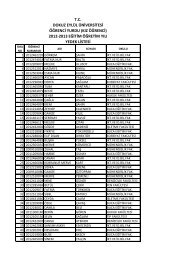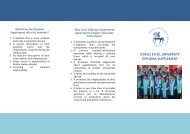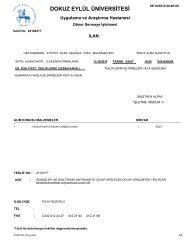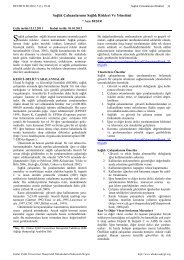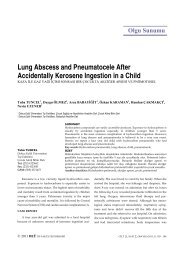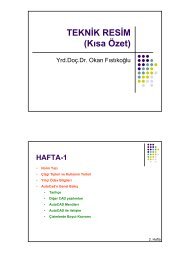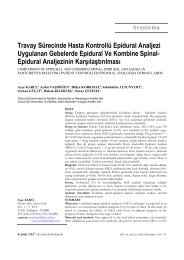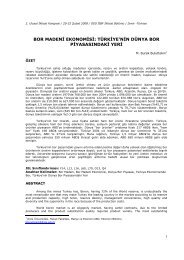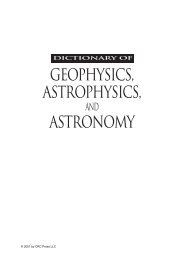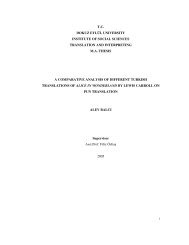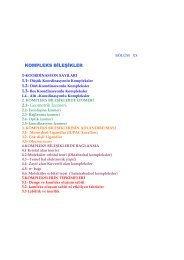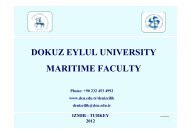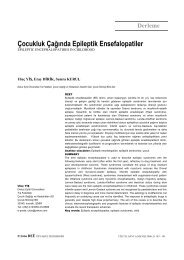the ideology of lexical choices in the turkish translations of oliver twist
the ideology of lexical choices in the turkish translations of oliver twist
the ideology of lexical choices in the turkish translations of oliver twist
Create successful ePaper yourself
Turn your PDF publications into a flip-book with our unique Google optimized e-Paper software.
<strong>the</strong> ethics <strong>of</strong> translation, which have been obeyed for thirty or forty years. He argues<br />
that what <strong>the</strong> publishers have made is an ideological distortion, and that <strong>the</strong>re is no<br />
mention <strong>in</strong> <strong>the</strong> books <strong>of</strong> <strong>the</strong> fact that <strong>the</strong>y are actually <strong>the</strong> abridged versions, which is<br />
contrary to <strong>the</strong> common practice <strong>in</strong> <strong>the</strong> world. He also po<strong>in</strong>ts out that publishers are<br />
only concerned about <strong>the</strong>ir own f<strong>in</strong>ancial <strong>in</strong>terests and <strong>the</strong> readers are merely<br />
deceived. Similarly, Nilay Yılmaz, a lecturer at <strong>the</strong> Department <strong>of</strong> L<strong>in</strong>guistics at<br />
İstanbul Bilgi University <strong>in</strong>dicates that <strong>the</strong> <strong>translations</strong> <strong>in</strong>volve <strong>the</strong> publishers’<br />
<strong>ideology</strong>, and when you purchase those versions, you also get <strong>the</strong> <strong>ideology</strong> attached<br />
to <strong>the</strong>m. She adds that this would result <strong>in</strong> children’s reluctance to read those books.<br />
In brief, Yılmaz argues that those books are actually used as an <strong>in</strong>strument for <strong>the</strong><br />
dissem<strong>in</strong>ation <strong>of</strong> <strong>the</strong> Islamist <strong>ideology</strong> (2006;<br />
http://www.radikal.com.tr/haber.php?haberno=196195).<br />
In <strong>the</strong> previously mentioned article “Masumiyet<strong>in</strong>i Tamamen Kaybeden<br />
Seçki: 100 Temel Eser” (“The Selection that Has Lost Its Innocence: “100 Essential<br />
Read<strong>in</strong>gs”) Necdet Neydim also argues that <strong>the</strong> Turkish versions <strong>of</strong> <strong>the</strong> Western<br />
Classics pr<strong>in</strong>ted by most <strong>of</strong> <strong>the</strong> publish<strong>in</strong>g houses are not ‘<strong>translations</strong>’ at all. They<br />
are only texts whose translators are anonymous and <strong>the</strong>y are produced for religious<br />
and/or ideological purposes. Ano<strong>the</strong>r po<strong>in</strong>t is that <strong>the</strong>y are hardly associated with <strong>the</strong><br />
source texts as <strong>the</strong>y have been reduced to 96 pages. As for <strong>the</strong> manipulation <strong>of</strong><br />
<strong>translations</strong>, he says that if children’s literature is <strong>in</strong> question, <strong>the</strong>y can be<br />
manipulated, because each society is responsible for protect<strong>in</strong>g its own children. In<br />
his view, as a matter <strong>of</strong> fact, one had better manipulate a text so as to prevent <strong>the</strong><br />
hegemony <strong>of</strong> any different culture and to prevent children from be<strong>in</strong>g affected by<br />
religious propaganda and <strong>in</strong>hibit <strong>the</strong> denigration <strong>of</strong> <strong>the</strong>ir values. In brief, Neydim<br />
argues that manipulation <strong>of</strong> literature is at times necessary, but one should th<strong>in</strong>k<br />
carefully about how s/he should do it. If one diverges from <strong>the</strong> aim <strong>of</strong> protect<strong>in</strong>g <strong>the</strong><br />
children and alter <strong>the</strong> source texts <strong>in</strong> l<strong>in</strong>e with his or her <strong>ideology</strong>, <strong>the</strong> question <strong>of</strong><br />
ethics arises, which is <strong>the</strong> topic <strong>of</strong> <strong>the</strong> controversy. He po<strong>in</strong>ts out that <strong>the</strong> Western<br />
classics naturally conta<strong>in</strong> cultural elements <strong>of</strong> Christianity s<strong>in</strong>ce most <strong>of</strong> <strong>the</strong>m are<br />
works <strong>of</strong> 18 th and 19 th centuries. A few decades ago, <strong>in</strong> <strong>the</strong> <strong>translations</strong> <strong>of</strong> those<br />
Western classics, Christian elements were also deleted or made less strong, but those<br />
alterations did not attract much attention. What used to be done, <strong>the</strong>n, corresponded<br />
23



